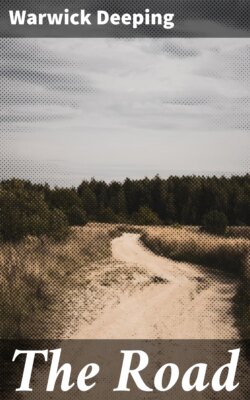Читать книгу The Road - Warwick Deeping - Страница 15
На сайте Литреса книга снята с продажи.
2
ОглавлениеTable of Contents
Bonthorn followed the lane. A few sprays of honeysuckle were out, and the buds of a wild rose showed points of crimson. The growth was deep and green below the hedges, vetch, sheep’s parsley, wild garlic, pimpernel, cleevers, and the grasses. He carried the dead dog as he would have carried a baby, its four paws tucked up, its eyes closed. He felt pity for this dead thing, for the creature that had ceased from all doggy delights, sniffings and adventures and tail waggings and the exploring of hedgerows. Rats. And those people had not stopped after breaking this little mongrel’s back.
Life in a hurry, the magniloquence of the machine, the mere sottishness of speed. Changed rhythms for the multitude, this strange age with its nose in a newspaper and its legs under a tank. Yet the grasses of the field were the same, and bees hung to the florets of the clover, and the briar burned in the green tangle, and the sun moved from equinox to solstice.
And those people at the Mill House, the nice lad who had opened the door for him, the girl with the compassionate eyes, old Prodgers of the Pills, Mrs. Robinia rather like a thrush. If they had a newness, they were all as old as time, perhaps without knowing it. Yes, the obdurate Martha—full of her pots and pans—was too quick to discover Magdalenes. Possibly the bee accused the butterfly of flightiness.
He entered the white gate in the yew hedge. A tawny shape rushed at him, paused, turned a head from side to side, whimpered. What was this white thing, this brother or rival?
Bonthorn spoke to the dog.
“Gently—gently. No fuss.”
He laid the dead thing on the grass under the cherry tree, and the Cairn, nervous and troubled, sniffed at it, and whimpered. From somewhere appeared Thomas the black cat, the patriarch not the kitten, brushed against Bonthorn’s legs, and then delivered a strange and unexpected gesture. The cat stalked softly and solemnly to the dead dog, put out a paw, and patted the white jowl. Almost—it was a caress.
Bonthorn stood stock-still, his blue eye pleased. The unexpectedness of animals! What moved them? The soft and surprising pat of a paw. He picked up the cat and snuggled his chin into the black fur.
“Gentleman—Thomas. I love you.”
He went for a spade. That oddity—old Osgood his gardener—had gone home with a scythe over his shoulder and his gnome’s face under an old straw hat, a “gent’s boater.” Bonthorn found a spade hanging from a nail in the tool-house with its old red roof. In a wild corner just above the orchard where foxgloves grew among the stools of hazels Bonthorn had a little graveyard. In the autumn squirrels hid nuts here; in the spring it was yellow with primroses and green with dog’s-mercury. Bonthorn dug his grave beside that of Tabitha a cat.
The dead dog had no collar, and his grave would be nameless, but those other animals attended the funeral, Thomas walking tail in air, Rollo trotting gravely. It was a ceremony. The cat sat solemnly and watched with yellow eyes, while the Cairn, stretched on his tummy, kept turning a head and blinking. Bonthorn laid the dead dog in the grave with a foxglove like a spire at its head. He filled in the soil and patted it gently with the spade.
“Requiescat in pace.”
Thomas looked at him intently, rose, licked himself, and walked daintily away.
Bonthorn rested a foot on the spade and meditated. The dog watched him. A blackbird perched, peered, and winged off into the orchard. Up the valley the Stella Lacey clock struck three deep, distant notes.
